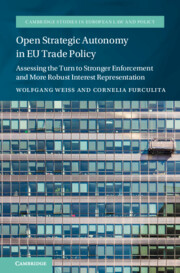 Open Strategic Autonomy in EU Trade Policy
Open Strategic Autonomy in EU Trade Policy from Part III - The Tools for Assertive Representation of EU Interests
Published online by Cambridge University Press: 29 November 2024
Chapter 11 brings together the insights gained in the analyses of the book and thus puts the EU’s recent turn towards a more assertive trade policy into broader perspective. It presents the results of the appraisal of the linkage between EU’s international and constitutional obligations. It also summarizes for the readers the key results from the book chapters and provides final answers to the research question. Thus, the chapter lists the instances in which the analysed instruments could conflict with EU’s international commitments and makes suggestions that would improve their chances of compliance, but it also mentions and praises the instruments that contribute to the credibility of the EU as an actor committed to international rule of law and multialteralism. Finally, this chapter describes potential further challenges of the EU trade policy change and its prospective application, which could also turn into opportunities and should be closely watched by the readers in the future, such as the evolution of new multilateral rules, the new complexity related to signing bilateral agreements, or issues related to the balance of powers among EU institutions.
To save this book to your Kindle, first ensure [email protected] is added to your Approved Personal Document E-mail List under your Personal Document Settings on the Manage Your Content and Devices page of your Amazon account. Then enter the ‘name’ part of your Kindle email address below. Find out more about saving to your Kindle.
Note you can select to save to either the @free.kindle.com or @kindle.com variations. ‘@free.kindle.com’ emails are free but can only be saved to your device when it is connected to wi-fi. ‘@kindle.com’ emails can be delivered even when you are not connected to wi-fi, but note that service fees apply.
Find out more about the Kindle Personal Document Service.
To save content items to your account, please confirm that you agree to abide by our usage policies. If this is the first time you use this feature, you will be asked to authorise Cambridge Core to connect with your account. Find out more about saving content to Dropbox.
To save content items to your account, please confirm that you agree to abide by our usage policies. If this is the first time you use this feature, you will be asked to authorise Cambridge Core to connect with your account. Find out more about saving content to Google Drive.